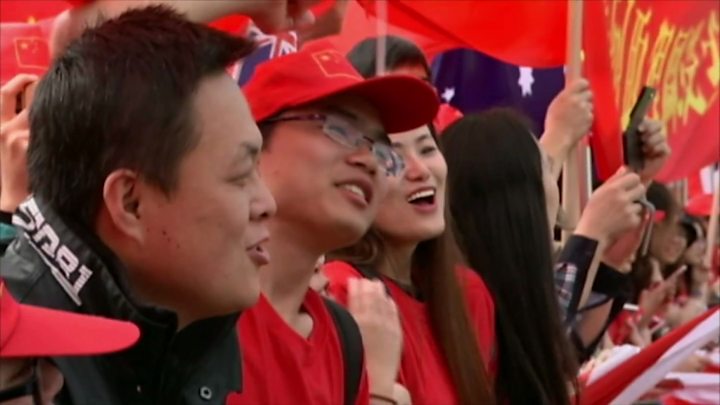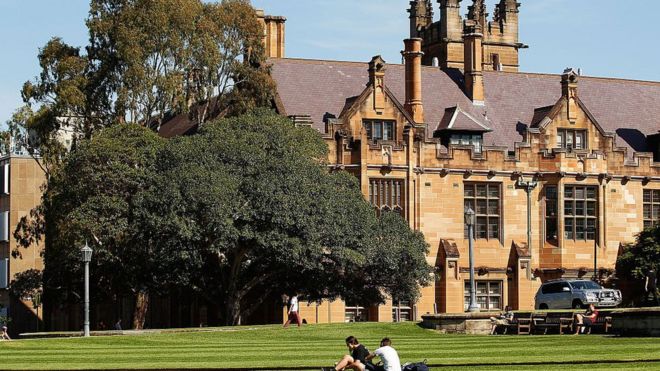Silent Invasion: How China is Turning Australia into a Puppet State
By Frances Mao
A brilliant new book asserts that the Chinese government is undermining Australia's sovereignty through a network of local agents.
Silent Invasion: How China is Turning Australia into a Puppet State by distinguished Australian academic Clive Hamilton, argues that Beijing's reach has extended into Australian politics, business, education and religious groups.
The book enraged China even before it was published.
Last year, publisher Allen & Unwin withdrew plans to release the book by fear of retaliation by Beijing, and later two other publishers had similar concerns.
Last year, publisher Allen & Unwin withdrew plans to release the book by fear of retaliation by Beijing, and later two other publishers had similar concerns.
The book is the latest addition to a wide-ranging discussion.
Prime Minister Malcolm Turnbull noted "disturbing reports about Chinese influence" when he unveiled a crackdown on Chinese interference last year.
In October, Australia's chief foreign affairs bureaucrat, Frances Adamson, warned Australian universities to be vigilant about massive efforts by China to exercise influence on campuses.
According to Fairfax Media, Australian lawmakers gave serious consideration to publishing the book under parliamentary privilege -- an unprecedented move that would have given it legal protection.
In October, Australia's chief foreign affairs bureaucrat, Frances Adamson, warned Australian universities to be vigilant about massive efforts by China to exercise influence on campuses.
According to Fairfax Media, Australian lawmakers gave serious consideration to publishing the book under parliamentary privilege -- an unprecedented move that would have given it legal protection.
Ultimately, though, Prof Hamilton found a commercial publisher.

Prof Clive Hamilton's book exposes China's web of influence.
Since its release, Chinese-Australians have accused the book of "fear-mongering".
Prominent observers and experts, however, have strongly defended it.
Since its release, Chinese-Australians have accused the book of "fear-mongering".
Prominent observers and experts, however, have strongly defended it.
What does the book expose?
Prof Hamilton asserts that China is a totalitarian regime bent on dominating Australia, and likens the relationship to "boy scouts up against Don Corleone" -- a reference to The Godfather.
"China plans to dominate the world, and has been using Australia and New Zealand as a testing ground for its tactics to assert its ascendancy in the West," writes Prof Hamilton, a lecturer in public ethics at Charles Sturt University.
He says such a suggestion would have been "fantastic" in the past, but now "so much evidence has accumulated that the conclusion seems irresistible".
Beijing has deliberately targeted its diaspora in Australia to recruit "informers, plants and spies" in business, academic, and other circles.
Aspects of society covered by the book include:
- Politics: Australia's two major parties are "severely compromised" by links to Chinese benefactors, and those "whose loyalties lie in Beijing".
- Community groups: Pro-Chinese government advocates have made an "almost complete takeover" of Chinese community groups in Australia, such as social organisations, student groups, professional bodies, as well as Chinese-language media. These groups are supported by China's embassy and promote subtle Beijing propaganda to Australia's politicians.
- Research: Chinese-Australian scientists and academics are allowing advanced research to be shared with Chinese universities, either unintentionally through joint projects, or because of duress.
They confirmed "what intelligence agencies have been telling government in secret for the last few years".
Last year, the Australian Security Intelligence Organisation warned in a report that Chinese communities in Australia were "the subject of covert influence operations" aimed at shutting down criticism.
 Pro-Chinese government advocates have made an complete takeover of Chinese community groups in Australia, such as social organisations, student groups, professional bodies, as well as Chinese-language media.
Pro-Chinese government advocates have made an complete takeover of Chinese community groups in Australia, such as social organisations, student groups, professional bodies, as well as Chinese-language media.
In December, a senator, Sam Dastyari, was forced to resign over scrutiny about his dealings with Huang Xiangmo, a Chinese businessman who was described by Mr Turnbull as having "close links to a foreign government".
Last year, the Australian Security Intelligence Organisation warned in a report that Chinese communities in Australia were "the subject of covert influence operations" aimed at shutting down criticism.
 Pro-Chinese government advocates have made an complete takeover of Chinese community groups in Australia, such as social organisations, student groups, professional bodies, as well as Chinese-language media.
Pro-Chinese government advocates have made an complete takeover of Chinese community groups in Australia, such as social organisations, student groups, professional bodies, as well as Chinese-language media. In December, a senator, Sam Dastyari, was forced to resign over scrutiny about his dealings with Huang Xiangmo, a Chinese businessman who was described by Mr Turnbull as having "close links to a foreign government".
Dastyari denied ever violating his "parliamentary oath".
Mr Turnbull's new crackdown will ban all foreign political donations, and force lobbyists to publicly register any overseas links.
Mr Turnbull's new crackdown will ban all foreign political donations, and force lobbyists to publicly register any overseas links.
What has been the response to the book?
China's embassy in Australia said Prof Hamilton had been "playing up the 'China threat' for quite some time".
China's embassy in Australia said Prof Hamilton had been "playing up the 'China threat' for quite some time".
Race Discrimination Commissioner Tim Soutphommasane, who has Chinese ancestry, said some language used in the book "smacks of The Yellow Peril revisited".
But others defended Prof Hamilton, arguing criticism of the book was almost inevitable because of the topics it covered.
China-Australia expert Prof John Fitzgerald, whose work is quoted in the book, said criticism focused on perceptions of the text, rather than what it said.
"None of the reviews have challenged any of the points made. Rather they're concerned it will generate a controversy that gets out of hand," said Prof Fitzgerald, from Swinburne University.
But others defended Prof Hamilton, arguing criticism of the book was almost inevitable because of the topics it covered.
China-Australia expert Prof John Fitzgerald, whose work is quoted in the book, said criticism focused on perceptions of the text, rather than what it said.
"None of the reviews have challenged any of the points made. Rather they're concerned it will generate a controversy that gets out of hand," said Prof Fitzgerald, from Swinburne University.
He defended the text as "a very important book" that had brought "government knowledge to public attention".
The book has international resonance, according to Prof Rory Medcalf, Head of the National Security College at the Australian National University.
"It is a book about how a multicultural democracy struggles when a foreign power exploits the open nature of its system," said Prof Medcalf, whose work is also quoted in the book.
He said Prof Hamilton's language was "darker than what government agencies would use", but it raised important concerns.
"It is a book about how a multicultural democracy struggles when a foreign power exploits the open nature of its system," said Prof Medcalf, whose work is also quoted in the book.
He said Prof Hamilton's language was "darker than what government agencies would use", but it raised important concerns.



